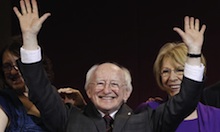
Sinn Fein plans to build on its 26-County presidential campaign by targeting the local elections in 2014, party officials have said.
The 13.7 per cent vote for Martin McGuinness represented the highest ever national vote for the party in a 26 County election. With more than 243,000 votes, McGuinness significantly outpolled Fine Gael’s Gay Mitchell and ended up third on first preference votes, behind President-elect Michael D Higgins of the Labour Party and former Fianna Fail Sean Gallagher.
He also passed the 12.5 per cent threshold required for the reimbursement of expenses. Howerver, there was some disappointment in the party that Mr McGuinness failed to match the party’s support in some recent opinion polls.
Speaking as the results came in, Mr McGuinness said that he was very happy that Michael D Higgins would be “waking up in the Aras” next month. “What’s done is done and what’s won is won and Michael D has won it and I fully congratulate him. I think he’ll make a great president and he’ll be my president also.” He said he had earlier spoken by telephone to the victorious candidate and wished him “my warmest congratulations”.
He said his revelation about Independent candidate and frontrunner Sean Gallagher’s involvement in a Fianna Fail fundraiser in Dundalk in 2008 during the final Presidential debate would go into the annals of television and political history.
The result was that the the more left-wing candidate was elected -- a poll showed some 16% of voters switched from the conservative Gallagher to Higgins in the final week.
The questions he asked were legitimate ones, he added. “I do have a concern about gombeenism, cronyism and the brown envelope culture which helped to destroy Irish economy and put most marginalised into extreme difficulty and I have no regrets about that.”
However, it was broadly acknowledged that the decision of the Sinn Fein Officer Board to field McGuinness, one of the party’s most controversial and polarising figures, was a poor one.
Sinn Fein was subjected to an unremitting focus on the past activities of the Provisional IRA and Mr McGuinness’s denials of involvement. With of the state’s two largest parties in disarray, the party missed out on an opportunity to capture a sizable share of the political middle ground.
The Deputy First Minister returned to his post this week facing fresh questions over his claim to have left the IRA in 1974. Meanwhile, President-elect Higgins said he would continue the work of his predecessor to ‘build bridges’ in the North.
The man who will soon be Ireland’s ninth president said his humanitarian work overseas had taught him that, even after peace is established, continued efforts were required to repair divided societies.
Mr Higgins, who visited his future home of Aras an Uachtaran in Dublin’s Phoenix Park today, is due to be inaugurated president in a ceremony at Dublin Castle on Friday, November 11.
![[Irish Republican News]](https://republican-news.org/graphics/title_gifs/rn.gif)
![[Irish Republican News]](https://republican-news.org/graphics/title_gifs/harp.gif)

